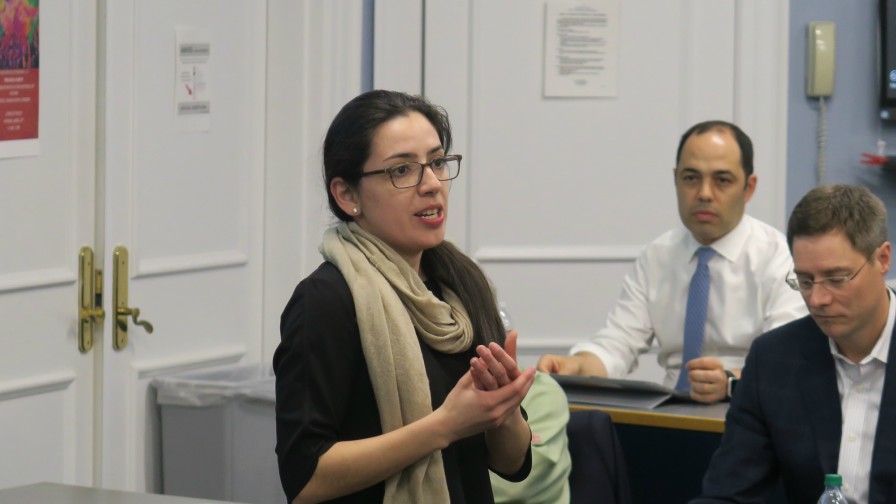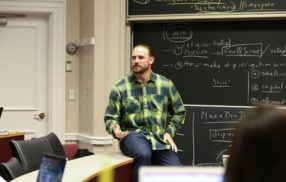
Investing in Clean Water: Can Private Capital Create Healthy Waterways and Earn a Return?
By Dave Hendrick
While governments and nonprofit organizations have historically played leading roles in the protection and maintenance of waterways and marine resources, the investing community is exploring the role it may play in ensuring the continued health of the critical resource.
During a University of Virginia Global Water Initiative event held at the Darden School of Business, participants at different stages of the water investing ecosystem spoke before a capacity crowd on the opportunities for cultivating both meaningful environmental and humanitarian impact as well as return on investment in the still nascent space.
Led by Professor Peter Debaere, the Darden-hosted Global Water Initiative examines issues pertaining to water through multiple disciplines.
Disque Deane, founder of the water-focused investment firm Water Asset Management, said water’s role as an investment had not yet been fully appreciated by the finance industry.
“We believe water is the commodity, the resource that will define this century in a way far greater than oil ever defined the last century,” Deane said.
The asset manager described the efficient flow of capital into the space as a force for good, enabling, among other things, better health outcomes and safer drinking water. The asset management firm’s investment thesis is that water demand is increasing dramatically, while global supply is constrained by a variety of factors, including inefficient use and poor groundwater management. Moreover, Deane said the industry has a number of attractive investment attributes, including demand that is largely divorced from economic cycles, positive pricing in water rates and high barriers to entry for new entities.
Deane called investment in water “the original impact investing,” a description that prompted pushback from some in the audience, who questioned whether investing in existing public or private water entities fell under the umbrella of impact investing.
Regardless of the moniker, Deane insisted that investment in the areas of water distribution, testing and measurement, treatment, and infrastructure — the four investment categories of his water fund — could pragmatically solve the world’s water problems. Other panelists further suggested that higher demand for those existing assets should reduce the cost of capital in the long term.
“Every problem that exists in water worldwide can be solved today using existing technology and proven solutions,” Deane said. “There is no widget that needs to be invented.”
Rockefeller Foundation Innovative Finance Analyst Andrea Barrios (MBA ’16) described the novel financing instruments that organizations, funded in part by the Rockefeller Foundation, were using to address water issues. These instruments ranged from the Forest Resilience Bonds offered by Blue Forest Conservation, which use private capital to help pay for forest restoration using a pay-for-success model, to an initiative launched with Atlanta’s Department of Watershed Management to sell the first-ever publicly offered environmental impact bond.
The efforts both represent new ways for private capital to help fill large funding gaps using a pay-for-success model, which generally describes an approach in which payment is tied to the delivery of positive outcomes in a social-minded space.
Barrios, who helped develop a pay-for-success model aimed at improving HIV patient outcomes in the Washington, D.C., area as part of the Kellogg-Morgan Stanley Sustainable Investing Challenge while at Darden, said Rockefeller was funding efforts of varying size in hopes of landing on effective future precedents.
“These are things that you can scale,” Barrios said, “We just need to create the first one.”
Brian Richter, the former chief water scientist of the Nature Conservancy, president of the water education group Sustainable Waters and instructor at UVA, spoke of the urgent need for additional dollars to combat water loss and water scarcity around the globe. In the U.S., Richter said many rivers in the West have lost about 50 percent of their summer water volume, declines that can have devastating effects to the people, animals and wildlife throughout the region.
Echoing other panelists, Richter said the actors who would be most likely to put the water back into the rivers would be those working on behalf of the environment “and bringing a checkbook.”
To that end, Sustainable Waters is part of a team seeking to raise $50 million for the Save Our Streams Fund. Described as an impact investing vehicle, the fund seeks to purchase farmland and water rights. In addition to bolstering water flows, a portion of the surplus water will be leased to generate investor returns.
“We need to carry a big treasure chest with us and this is our best hope of being able to restore some of those impaired and endangered ecosystems,” said Richter.
Offering the investment management perspective, Cornerstone Partners Senior Managing Director Kevin Schuyler (MBA ’97) said many of the nonprofit clients his Charlottesville-based firm invests for are increasingly interested in investing in the environmental, social and corporate governance, or ESG, space.
Particularly at universities, Schuyler said there has been an evolution in investment philosophy from one considering returns above all else to a more nuanced consideration.
“One of the things that’s really exciting for me is the conversation in the boardroom has changed,” said Schuyler, who previously served as chief investment officer of The Nature Conservancy. “It has really evolved to this idea that, whether university or not, we are educating people to be global citizens and educating people to contribute to society and not just thinking of themselves, but of the greater good.”
The University of Virginia Darden School of Business prepares responsible global leaders through unparalleled transformational learning experiences. Darden’s graduate degree programs (MBA, MSBA and Ph.D.) and Executive Education & Lifelong Learning programs offered by the Darden School Foundation set the stage for a lifetime of career advancement and impact. Darden’s top-ranked faculty, renowned for teaching excellence, inspires and shapes modern business leadership worldwide through research, thought leadership and business publishing. Darden has Grounds in Charlottesville, Virginia, and the Washington, D.C., area and a global community that includes 18,000 alumni in 90 countries. Darden was established in 1955 at the University of Virginia, a top public university founded by Thomas Jefferson in 1819 in Charlottesville, Virginia.
Press Contact
Molly Mitchell
Associate Director of Content Marketing and Social Media
Darden School of Business
University of Virginia
MitchellM@darden.virginia.edu








